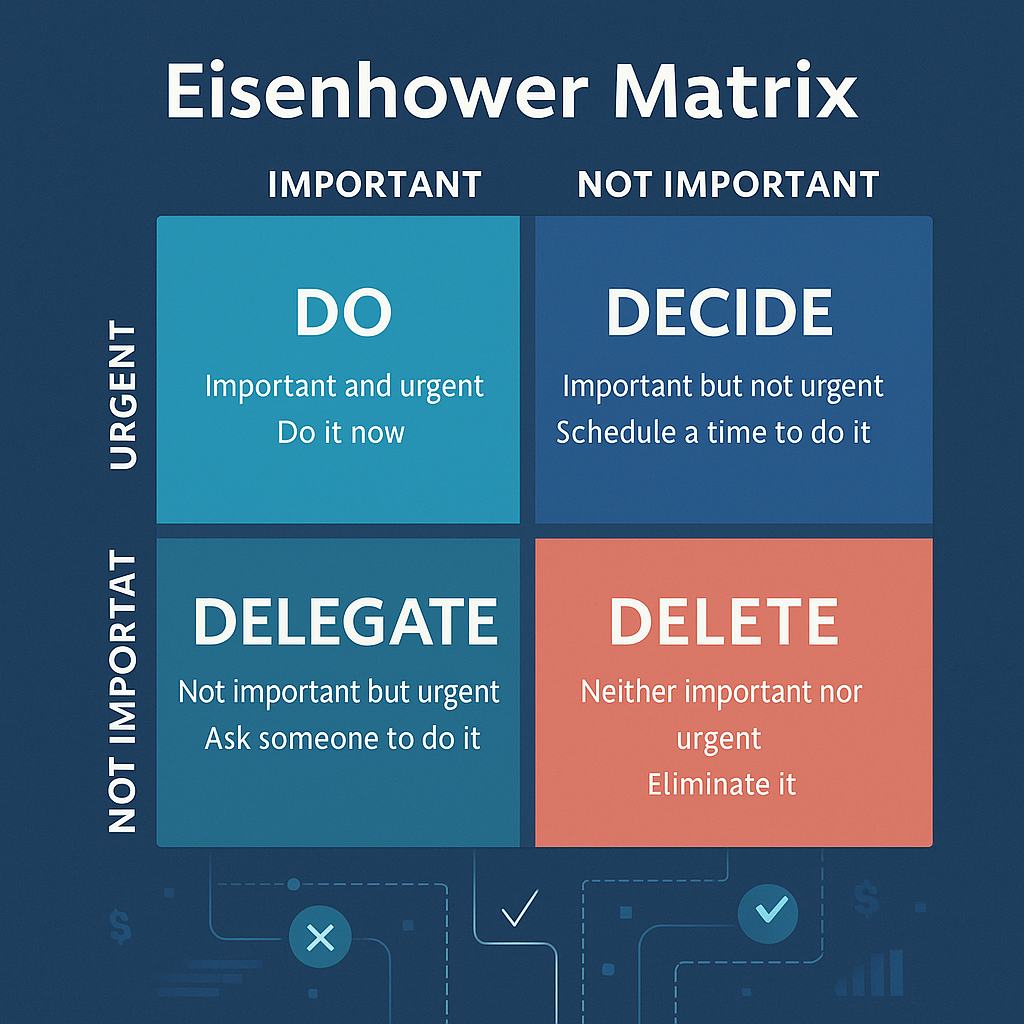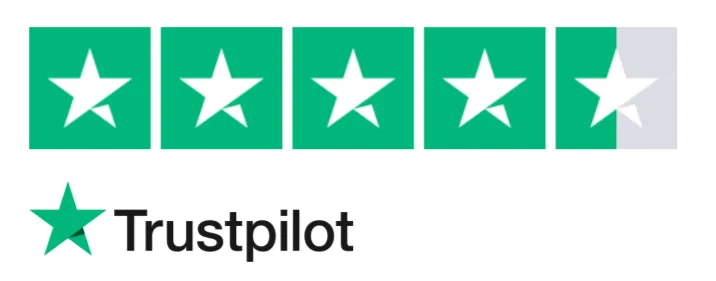Feeling constantly busy but not getting things done? You're not alone. Productivity at work isn’t just about checking off tasks, it’s about reducing stress, increasing satisfaction, and achieving better results with the time you have. Learning to work smarter, not harder, can be a game-changer, whether in an office, remote, or hybrid setup. Small, intentional changes to managing your time and energy can improve focus, output, and job satisfaction.
This guide offers actionable tips to improve your productivity today.
1. Clarify and Prioritize Your Tasks
A clear plan is the foundation of a productive day. Without one, you may be overwhelmed with tasks and unable to focus on what truly matters. Create a daily or weekly to-do list to keep yourself organized and reduce mental clutter.
- Prioritize tasks:
- Eisenhower matrix: Categorize tasks by urgency and importance to decide what to work on first.

Eisenhower Matrix - ABCDE method: Label tasks from A (highest priority) to E (lowest priority).
- MITs (Most important tasks): Focus on 1-3 critical daily items.
- Eisenhower matrix: Categorize tasks by urgency and importance to decide what to work on first.
- Break down big projects: Large tasks can feel daunting. Breaking them into smaller steps makes them more manageable.
- Use time blocking: Allocate specific times on your calendar for tasks to ensure you're focused on what matters most.
- Tools: Notion, Trello, ClickUp
2. Effective Time Management
Time is a precious resource. Managing it well is key to staying on top of your tasks without feeling overwhelmed.
- Conduct a time audit: Track your daily activities to identify areas where time is wasted.
- Set realistic deadlines: Assign deadlines to tasks to maintain urgency and ensure you're staying on track.
- Batch similar tasks: Grouping related tasks together helps reduce time lost when switching between them.
- Use the Pomodoro technique: Work in focused intervals (e.g., 25 minutes) followed by a short break to maintain productivity.
- Learn to say no: Saying yes to everything can dilute your focus. Politely decline tasks that don't align with your priorities.
- Tools: Google Calendar, TimeHero, Pomodoro apps
3. Reduce Multitasking and Distractions
Multitasking may seem efficient, but it can reduce your focus and increase the chance of making mistakes.
- Minimize distractions: Identify and remove common distractions like phone notifications or noisy environments.
- Create a dedicated workspace: Organize your workspace, whether at home or in the office, to promote focus.
- Practice mindfulness: Engaging in mindfulness exercises or meditation trains your brain to focus on the present moment. Regular practice sharpens focus and improves concentration.
- Take regular breaks: Short breaks (5-10 minutes) can keep your mind refreshed and boost productivity in the long run.
- Tools: Freedom, Focus@Will, Trello, Headspace
4. Automate Repetitive Tasks
Manual tasks can take time, but automation helps simplify processes and increase efficiency.
- Use tools to automate tasks: Automate processes like email responses, data extraction, and document sorting to save valuable time.
- Tools: Parseur automatically extracts structured data from documents and emails. This reduces the need for manual data entry, improving accuracy and workflow efficiency. With Parseur, businesses can save time by automating the extraction of crucial information from complex documents.
- Integrate Parseur with Zapier or Make: Parseur integrates seamlessly with Zapier or Make, enabling automation across multiple applications. This integration helps automate entire workflows, reducing repetitive tasks and allowing you to focus on more strategic work.
- Tools: Parseur, Zapier, Make
5. Optimize Your Workspace
A clean and organized workspace allows you to stay focused and avoid distractions.
- Maintain a clean workspace: Whether physical or digital, a tidy space promotes mental clarity and focus.
- Organize files and folders: Regularly organize your digital files and folders to ensure you can quickly access your needs.
- Use consistent naming conventions: A consistent system for naming files and folders makes it easier to locate documents when needed.
6. Take Strategic Breaks
Working nonstop can lead to burnout and decreased productivity. Taking regular breaks is essential to maintain high levels of focus and energy.
- Quick breaks (5-10 minutes): These breaks give your mind a chance to recharge, improving productivity and creativity when you return to work.
- Go for a walk or stretch: Physical movement helps reduce stress and refreshes your body and mind.
- Breathing exercises: Simple deep breathing exercises can help clear your mind and improve focus.
7. Communicate Efficiently
Precise and efficient communication reduces misunderstandings and helps maintain productivity when working with others.
- Shorter, clearer emails: Focus on getting to the point quickly.
- Use voice notes: Voice messages are often more efficient for explaining complex ideas than long emails.
- Visual walkthroughs: Tools like Loom and Tango help create visual instructions to simplify complex tasks, saving you and your colleagues time.
8. Weekly Productivity Reviews
Regularly assessing your progress helps you improve and stay aligned with long-term goals.
- Review successes and challenges: At the end of each week, reflect on your accomplishments and areas where you faced difficulties.
- Align with long-term goals: Use the insights from your review to make adjustments that will bring you closer to your larger objectives.
9. Maintain Healthy Habits
Healthy habits play a significant role in sustaining productivity.
- Sleep: Aim for 7-9 hours of sleep per night to allow your mind and body to recover.
- Balanced diet: Eating a nutritious diet supports both physical and mental performance.
- Exercise regularly. Physical activity boosts cognitive function, energy, and mental clarity, all of which contribute to a more organized day.
Conclusion
Being focused at work is about working smarter, not harder. You can significantly boost your efficiency by clarifying and prioritizing tasks, managing time effectively, focusing on one task at a time, and using tools like Parseur. Parseur helps automate repetitive tasks like data entry and document management, freeing your time for more valuable work.
Remember, productivity is a journey of continuous improvement. Start small, experiment with different strategies, and find what works best for you. Apply these tips and make each workday more organized, reducing stress and achieving better results!
Last updated on




